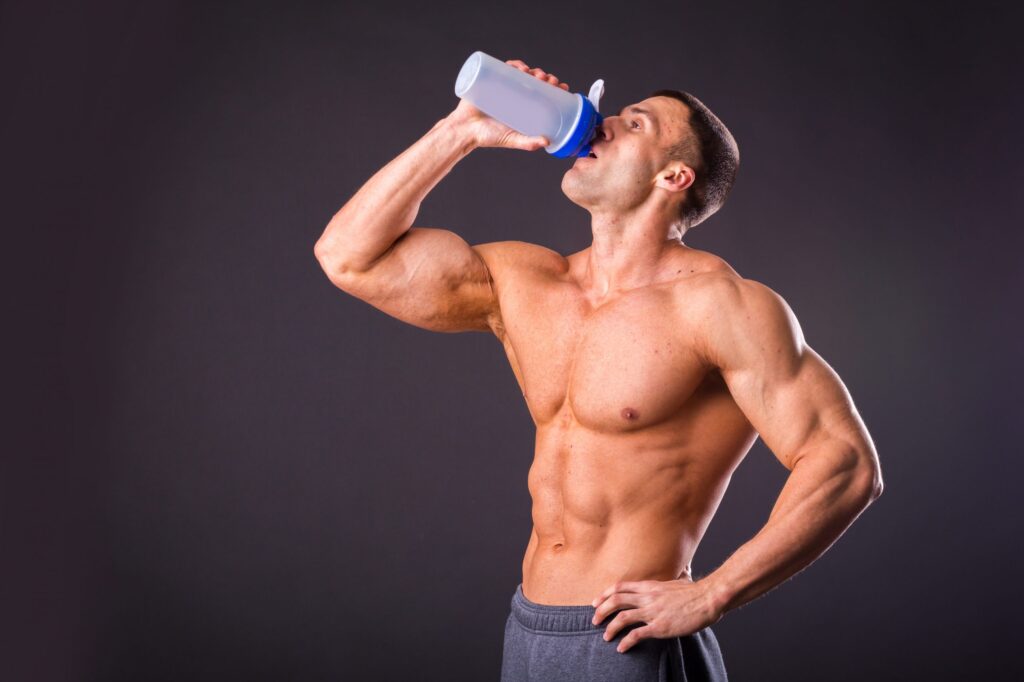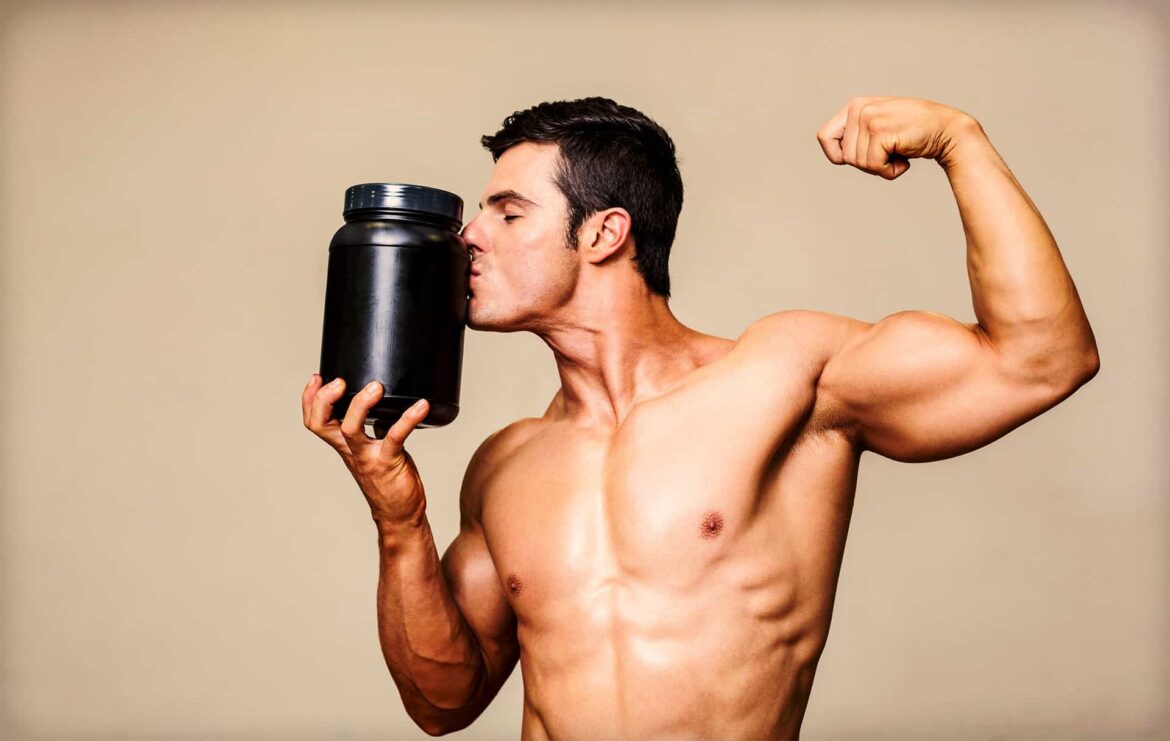Introduction
How Much Water To Drink On Creatine Bodybuilding: Hydration is a critical aspect of any fitness regimen, especially when it comes to bodybuilding. And when you introduce creatine supplementation into the equation, the importance of water consumption takes center stage. Creatine is a widely used and well-researched dietary supplement that has been shown to enhance muscle performance, strength, and size. However, its effectiveness can be greatly influenced by how much water you drink.
In this guide, we delve into the pivotal role of hydration in the context of creatine and bodybuilding. Understanding the optimal water intake while using creatine is not only crucial for maximizing its benefits but also for maintaining overall health and well-being. We will explore the science behind the relationship between creatine and hydration, address common misconceptions, and provide practical tips to help you strike the right balance between water consumption and creatine supplementation. So, whether you’re a seasoned bodybuilder or just embarking on your fitness journey, read on to discover the key to unlocking your full potential with creatine in bodybuilding.
In the world of bodybuilding, the pursuit of strength, muscle gains, and peak performance is a relentless journey. Creatine, a naturally occurring compound found in small quantities in certain foods and synthesized within the body, has emerged as a trusted ally in this quest. Its ability to enhance energy production, aid in muscle recovery, and promote muscle growth has made it a staple in the supplement arsenals of many athletes and fitness enthusiasts.However, the benefits of creatine can be amplified or diminished based on various factors, with one of the most significant being hydration. Water, often overlooked amidst the protein shakes and pre-workout supplements, plays a pivotal role in how creatine functions within the body.

How fast do muscles grow on creatine?
After you start taking creatine, it takes time for its levels in your muscles to gradually increase and fully saturate. It doesn’t happen overnight. And, in fact, it often takes a couple of weeks to significantly increase.Indeed, the rate at which muscles grow when supplementing with creatine is not an instantaneous process. Creatine, a naturally occurring compound primarily found in red meat and synthesized within the body, plays a crucial role in energy production during high-intensity, short-duration activities like weightlifting and sprinting. When you begin taking creatine as a supplement, it doesn’t lead to an immediate, noticeable increase in muscle size.
Here’s a brief overview of the timeline for muscle growth on creatine:
Loading Phase (Optional): Some individuals choose to undertake a loading phase when starting creatine supplementation, which involves taking higher doses (around 20 grams per day) for 5-7 days. This can help saturate muscle creatine levels more quickly.
Saturating Muscle Stores: Regardless of whether you opt for a loading phase, the primary goal is to increase the creatinine levels within your muscles. This process takes time, often a couple of weeks or longer.
Performance Benefits First: Initially, you may notice improvements in exercise performance, such as increased strength and the ability to lift heavier weights or complete more repetitions. This is often one of the first effects of creatine supplementation.
Muscle Size and Volume: Muscle growth, in terms of increased size and volume, typically follows the performance improvements. This can take several weeks to months of consistent creatine use, combined with a proper resistance training regimen and adequate nutrition.
Should I drink more water when taking creatine?
It’s essential to drink plenty of water when taking creatine to get the most out of the supplements. Creatine might cause you to gain some weight from the water pulled into your muscles.Yes, it’s crucial to increase your water intake when taking creatine supplements. Creatine has a unique mechanism of action that involves drawing water into the muscle cells, which can lead to an increase in body weight.
Here’s why proper hydration is important when supplementing with creatine:
Maintaining Hydration: Creatine helps increase the water content within muscle cells, which is a part of the mechanism behind its performance-enhancing effects. This process can cause you to become temporarily more hydrated within your muscles but may also lead to a slight decrease in overall body hydration if you don’t drink enough water.
Minimizing Potential Side Effects: Inadequate hydration can sometimes result in side effects like cramping or gastrointestinal discomfort when taking creatine. Ensuring proper water intake can help reduce the likelihood of these issues.
Maximizing Creatine’s Benefits: To get the most out of creatine, you want to ensure that it’s fully saturated within your muscles. Staying well-hydrated helps facilitate this process and ensures that creatine can effectively support your energy needs during workouts.
Weight Gain: As mentioned, creatine can lead to temporary weight gain due to increased water retention within muscles. This weight gain is not fat; it’s water weight. By maintaining adequate hydration, you can support this process and minimize the risk of dehydration.
How much water should I drink with creatine?
To account for physical activity and creatine use, most people should aim for at least 3 to 4 liters of water, or 12 to 16 cups, per day. If you don’t drink enough water, your creatine may not work optimally, which means your muscles and gym performance won’t benefit from your supplement.Your recommended water intake can vary depending on various factors such as your body size, activity level, climate, and individual hydration needs. While the general guideline for daily water intake is often cited as 8-10 glasses (about 2-2.5 liters), there are additional considerations when supplementing with creatine and engaging in physical activity.
Here’s a more tailored recommendation:
Base Hydration: Start with a baseline of around 2-2.5 liters (8-10 cups) of water per day. This is a good starting point for maintaining general hydration.
Physical Activity: If you engage in regular physical activity, especially intense workouts, your water requirements increase. Sweating can lead to significant fluid loss, and you’ll need to replace those lost fluids. Depending on the intensity and duration of your workouts, you may need an additional 1-2 liters (4-8 cups) of water on exercise days.
Creatine Supplementation: Creatine can increase water retention within muscle cells, so it’s essential to ensure you stay well-hydrated to support this process. On days when you take creatine, consider adding an extra glass or two of water to your baseline intake.
Individual Factors: Individual factors like body size, metabolism, and climate can also affect your hydration needs. In hot or dry climates, you may need to drink more to compensate for increased fluid loss through sweat.
How much muscle can you gain from creatine?
It depends on your exercise routine. But some studies show that people who take creatine supplements may gain an extra two to four pounds of muscle mass during four to 12 weeks of regular exercise than people who don’t take creatine.The amount of muscle gain you can expect from creatine supplementation, as with any dietary supplement or fitness program, can vary widely based on several factors, including your exercise routine, diet, genetics, and overall lifestyle. However, research suggests that creatine can indeed have a positive impact on muscle growth when combined with resistance training.
Resistance Training: Creatine is most effective when used in conjunction with a structured resistance training program. The studies you mentioned often show that individuals who take creatine and engage in regular resistance training may experience greater muscle gains compared to those who only exercise without creatine.
Duration: The timeframe for observing significant muscle gains with creatine can vary, but many studies show positive results within four to 12 weeks of consistent use.
Individual Response: People respond differently to creatine. While some individuals may experience substantial muscle gains, others may see more modest improvements. Genetic factors, diet, training intensity, and other variables play a role in individual responses.
Dosage and Loading: Some people choose to undergo a loading phase when starting creatine, which involves taking higher doses initially to saturate muscle creatine stores faster. Others opt for a lower, maintenance dose without a loading phase. Both approaches can be effective.
Diet: Adequate nutrition, including protein intake, is essential for supporting muscle growth. Creatine alone won’t maximize muscle gains; it complements a well-rounded diet and exercise regimen.
How do I know creatine is working?
If you’ve started taking creatine, you should know if it works for you in about a week. If your training volume increases, it’s working for you. If not, you’re probably a non-responder, and taking the powder isn’t going to help you. Diet is important.The effectiveness of creatine can vary from person to person, and it’s essential to understand that individual responses to creatine supplementation differ.
Here are some guidelines to help you determine if creatine is working for you:
Performance Improvement: One of the most common signs that creatine is working is an improvement in exercise performance. You may notice an increase in strength, the ability to lift heavier weights, or complete more repetitions during your workouts. This often occurs within the first few weeks of creatine use.
Muscle Fullness and Pump: Some individuals experience a noticeable muscle fullness or “pump” during and after workouts when using creatine. This can be an indicator of increased water content within muscle cells, which is a normal response to creatine supplementation.
Weight Gain: As mentioned earlier, creatine can lead to temporary weight gain due to increased water retention within muscle cells. If you notice a slight increase in body weight without a significant change in your diet or exercise routine, it may be a sign that creatine is working as intended.
Individual Variation: Keep in mind that not everyone responds to creatine in the same way. Some individuals are “responders” who experience noticeable benefits, while others may be “non-responders” who see fewer or no apparent changes. Genetic factors can play a role in how your body reacts to creatine.
Consistency is Key: To determine if creatine is working for you, it’s essential to be consistent with your supplementation and training. Give it time—often several weeks—to see the full effects. Creatine’s benefits can become more pronounced with long-term use.
What is the best way to drink creatine?
The proper way to take creatine is to follow a loading phase (5-7 days) with higher daily doses, then transition to a maintenance phase with a lower daily dose of 3 to 5 grams. Consume creatine with water, juice, or a meal for optimal absorption.The way you take creatine can significantly impact its effectiveness.
Here’s a recommended approach:
Loading Phase (Optional):
Loading Phase Duration: If you choose to do a loading phase, it typically lasts for 5-7 days.
Loading Dose: During this phase, you’ll take a higher daily dose of creatine, usually around 20 grams per day, divided into 4 doses of 5 grams each. This loading phase is intended to rapidly saturate your muscles with creatine.
Maintenance Phase:
Duration: After the loading phase, transition to the maintenance phase.
Maintenance Dose: In the maintenance phase, take a lower daily dose of creatine, typically 3 to 5 grams per day. This is sufficient to keep your muscle creatine levels elevated.
How to Take Creatine:
Timing: Creatine can be taken at any time of the day that suits your schedule. There is no strong evidence to suggest that timing makes a significant difference. Some people prefer taking it before or after workouts, while others take it with a meal.
Mixing: Mix your creatine powder with water, juice, or a carbohydrate-containing beverage. This can help enhance creatine uptake into the muscles. Avoid mixing it with caffeine-containing beverages as caffeine may interfere with creatine absorption.
Consistency: Be consistent with your dosing. Taking creatine daily, even on rest days, is important to maintain muscle saturation levels.
Hydration: As mentioned earlier, it’s crucial to stay adequately hydrated when taking creatine. Ensure you drink plenty of water throughout the day to support the effectiveness of creatine.
Purity: Choose a high-quality creatine monohydrate supplement. It’s the most studied and widely used form of creatine with a strong safety and efficacy profile.
Consultation: If you have any underlying health conditions or concerns about creatine supplementation, consult with a healthcare provider or a registered dietitian before starting.
How much water should I drink with creatine?
To account for physical activity and creatine use, most people should aim for at least 3 to 4 liters of water, or 12 to 16 cups, per day. If you don’t drink enough water, your creatine may not work optimally, which means your muscles and gym performance won’t benefit from your supplement.Your recommended water intake, especially when taking creatine and engaging in physical activity, can indeed vary depending on several factors like body size, activity level, climate, and individual hydration needs.
Base Hydration: Start with a baseline of around 2-2.5 liters (8-10 cups) of water per day for general hydration.
Physical Activity: If you engage in regular physical activity, especially intense workouts, your water requirements increase. Sweating can lead to significant fluid loss, and you’ll need to replace those lost fluids. Depending on the intensity and duration of your workouts, you may need an additional 1-2 liters (4-8 cups) of water on exercise days.
Creatine Supplementation: Creatine can increase water retention within muscle cells, so it’s essential to ensure you stay well-hydrated to support this process. On days when you take creatine, consider adding an extra glass or two of water to your baseline intake.
Individual Factors: Individual factors like body size, metabolism, and climate can also affect your hydration needs. In hot or dry climates, you may need to drink more to compensate for increased fluid loss through sweat.
Is 2 liters of water enough for creatine?
Optimally, you should mix 3-5 grams of creatine monohydrate with 6-8 ounces of water and consume it daily. In terms of total daily water intake, aim to consume around a gallon (3-4 liters) of water while supplementing with creatine.To get the best results from creatine supplementation and maintain proper hydration, it’s recommended to consume around a gallon (3-4 liters) of water per day while supplementing with creatine. This includes both the water you use to mix with creatine and your overall daily water intake.
Here’s a breakdown of how you can incorporate water when taking creatine:
Creatine Mixing: Mix 3-5 grams of creatine monohydrate with 6-8 ounces (about 177-237 milliliters) of water or a carbohydrate-containing beverage (e.g., juice) daily. This provides an effective way to deliver creatine to your muscles.
Total Daily Water Intake: In addition to the water used for creatine mixing, aim to drink at least 3-4 liters (about 12-16 cups) of water throughout the day. This helps ensure you remain well-hydrated, especially if you are physically active.

Conclusion
The relationship between water intake and creatine supplementation in the realm of bodybuilding is undeniably significant. Proper hydration is the cornerstone upon which the benefits of creatine are built. Whether you’re aiming to boost muscle growth, increase strength, or enhance exercise performance, understanding the importance of adequate water consumption is paramount.
As we’ve explored, creatine’s mechanism involves drawing water into muscle cells, aiding in energy production and supporting muscle function. To harness the full potential of creatine in bodybuilding, it’s crucial to strike a balance between creatine supplementation and hydration. Aiming for a daily water intake of 3-4 liters while using creatine is a practical guideline to ensure optimal results.
Ultimately, the fusion of creatine and hydration empowers bodybuilders to push their limits, recover more efficiently, and achieve their fitness aspirations. By recognizing the synergy between these two elements, individuals can embark on their bodybuilding journey with a holistic approach, unlocking the true potential of their physical prowess. Remember, the foundation of strength and muscle growth often begins with a simple yet profound act—staying well-hydrated while maximizing the benefits of creatine.

